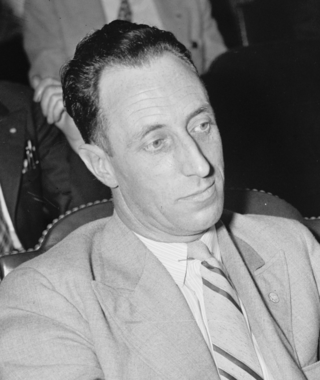
The American Civil Liberties Union (ACLU) is an American nonprofit human rights organization founded in 1920. The organization strives "to defend and preserve the individual rights and liberties guaranteed to every person in this country by the Constitution and laws of the United States." The ACLU works through litigation and lobbying and has more than 1,800,000 members as of July 2018, with an annual budget over $300 million. ACLU affiliates are active in all 50 states, Washington, D.C., and Puerto Rico. The ACLU provides legal assistance in cases where it considers civil liberties at risk. Legal support from the ACLU can take the form of direct legal representation or preparation of amicus curiae briefs expressing legal arguments when another law firm is already providing representation.

The Fourteenth Amendment to the United States Constitution was adopted on July 9, 1868, as one of the Reconstruction Amendments. Usually considered one of the most consequential amendments, it addresses citizenship rights and equal protection under the law and was proposed in response to issues related to formerly enslaved Americans following the American Civil War. The amendment was bitterly contested, particularly by the states of the defeated Confederacy, which were forced to ratify it in order to regain representation in Congress. The amendment, particularly its first section, is one of the most litigated parts of the Constitution, forming the basis for landmark Supreme Court decisions such as Brown v. Board of Education (1954) regarding racial segregation, Loving v. Virginia (1967) regarding interracial marriage, Roe v. Wade (1973) regarding abortion, Bush v. Gore (2000) regarding the 2000 presidential election, Obergefell v. Hodges (2015) regarding same-sex marriage, and Students for Fair Admissions v. Harvard (2023) regarding race-based college admissions. The amendment limits the actions of all state and local officials, and also those acting on behalf of such officials.

The Sixteenth Amendment to the United States Constitution allows Congress to levy an income tax without apportioning it among the states on the basis of population. It was passed by Congress in 1909 in response to the 1895 Supreme Court case of Pollock v. Farmers' Loan & Trust Co. The Sixteenth Amendment was ratified by the requisite number of states on February 3, 1913, and effectively overruled the Supreme Court's ruling in Pollock.

The Labor Management Relations Act of 1947, better known as the Taft–Hartley Act, is a United States federal law that restricts the activities and power of labor unions. It was enacted by the 80th United States Congress over the veto of President Harry S. Truman, becoming law on June 23, 1947.
Adair v. United States, 208 U.S. 161 (1908), was a US labor law case of the United States Supreme Court which declared that bans on "yellow-dog" contracts were unconstitutional. The decision reaffirmed the doctrine of freedom of contract which was first recognized by the Court in Allgeyer v. Louisiana (1897). For this reason, Adair is often seen as defining what has come to be known as the Lochner era, a period in American legal history in which the Supreme Court tended to invalidate legislation aimed at regulating business.
Griswold v. Connecticut, 381 U.S. 479 (1965), was a landmark decision of the U.S. Supreme Court in which the Court ruled that the Constitution of the United States protects the liberty of married couples to use contraceptives without government restriction. The case involved a Connecticut "Comstock law" that prohibited any person from using "any drug, medicinal article or instrument for the purpose of preventing conception". The court held that the statute was unconstitutional, and that its effect was "to deny disadvantaged citizens ... access to medical assistance and up-to-date information in respect to proper methods of birth control." By a vote of 7–2, the Supreme Court invalidated the law on the grounds that it violated the "right to marital privacy", establishing the basis for the right to privacy with respect to intimate practices. This and other cases view the right to privacy as "protected from governmental intrusion".

The National Labor Relations Board (NLRB) is an independent agency of the federal government of the United States that enforces U.S. labor law in relation to collective bargaining and unfair labor practices. Under the National Labor Relations Act of 1935, the NLRB has the authority to supervise elections for labor union representation and to investigate and remedy unfair labor practices. Unfair labor practices may involve union-related situations or instances of protected concerted activity.

The Labor Management Reporting and Disclosure Act of 1959, is a US labor law that regulates labor unions' internal affairs and their officials' relationships with employers.
Gitlow v. New York, 268 U.S. 652 (1925), was a landmark decision of the United States Supreme Court holding that the Fourteenth Amendment to the United States Constitution had extended the First Amendment's provisions protecting freedom of speech and freedom of the press to apply to the governments of U.S. states. Along with Chicago, Burlington & Quincy Railroad Co. v. City of Chicago (1897), it was one of the first major cases involving the incorporation of the Bill of Rights. It was also one of a series of Supreme Court cases that defined the scope of the First Amendment's protection of free speech and established the standard to which a state or the federal government would be held when it criminalized speech or writing.

Harry Bridges was an Australian-born American union leader, first with the International Longshoremen's Association (ILA). In 1937, he led several chapters in forming a new union, the International Longshore and Warehouse Union (ILWU), expanding members to workers in warehouses, and led it for the next 40 years. He was prosecuted for his labor organizing and designated as subversive by the U.S. government during the 1930s, 1940s, and 1950s, with the goal of deportation. This was never achieved.

The Surface Transportation Assistance Act of 1982 was a comprehensive transportation funding and policy act of the United States Federal Government, 96 Stat. 2097. The legislation was championed by the Reagan administration to address concerns about the surface transportation infrastructure. The Act contained Title V, known as the Highway Revenue Act of 1982, which added five cents to the per gallon gas tax, of which four cents was dedicated to restore interstate highways and bridges, and one cent for public transit. The Act also set a goal of 10 percent for participation of disadvantaged business enterprises in federal-aid projects.
Brown v. Hotel and Restaurant Employees, 468 U.S. 491 (1984), is a 4-to-3 ruling by the United States Supreme Court which held that a New Jersey state gaming law requiring union leaders to be of good moral character was not preempted by the National Labor Relations Act (NLRA).

The Fifth Amendment to the United States Constitution creates several constitutional rights, limiting governmental powers focusing on criminal procedures. It was ratified, along with nine other articles, in 1791 as part of the Bill of Rights.
Tax protesters in the United States advance a number of constitutional arguments asserting that the imposition, assessment and collection of the federal income tax violates the United States Constitution. These kinds of arguments, though related to, are distinguished from statutory and administrative arguments, which presuppose the constitutionality of the income tax, as well as from general conspiracy arguments, which are based upon the proposition that the three branches of the federal government are involved together in a deliberate, on-going campaign of deception for the purpose of defrauding individuals or entities of their wealth or profits. Although constitutional challenges to U.S. tax laws are frequently directed towards the validity and effect of the Sixteenth Amendment, assertions that the income tax violates various other provisions of the Constitution have been made as well.
De Veau v. Braisted, 363 U.S. 144 (1960), is a 5-to-3 ruling by the Supreme Court of the United States that an interstate compact restricting convicted felons from holding union office is not preempted by the National Labor Relations Act or the Labor Management Reporting and Disclosure Act, does not violate the Due Process Clause of the 14th Amendment, and is not an ex post facto law or bill of attainder in violation of Article One, Section 10 of the Constitution.
American Communications Association v. Douds, 339 U.S. 382 (1950), is a 5-to-1 ruling by the United States Supreme Court which held that the Taft–Hartley Act's imposition of an anti-communist oath on labor union leaders does not violate the First Amendment to the United States Constitution, is not an ex post facto law or bill of attainder in violation of Article One, Section 10 of the United States Constitution, and is not a "test oath" in violation of Article Six of the Constitution.
United Public Workers v. Mitchell, 330 U.S. 75 (1947), is a 4-to-3 ruling by the United States Supreme Court which held that the Hatch Act of 1939, as amended in 1940, does not violate the First, Fifth, Ninth, or Tenth amendments to U.S. Constitution.
Wong Wing v. United States, 163 U.S. 228 (1896), was a United States Supreme Court case in which the Court found that the Fifth and Sixth Amendments to the U.S. Constitution forbid the imprisonment at hard labor without a jury trial for noncitizens convicted of illegal entry to or presence in the United States.
Archie Brown (1911-1990) was an American longshore worker and union organizer for the International Longshore and Warehouse Union, active in San Francisco. An open communist, Brown was the defendant in the landmark US Supreme Court case United States v. Brown, which overturned a provision of the Landrum-Griffin Act barring communists from holding leadership positions in labor unions. The Supreme Court ruled in his favor, overturning his previous conviction.





